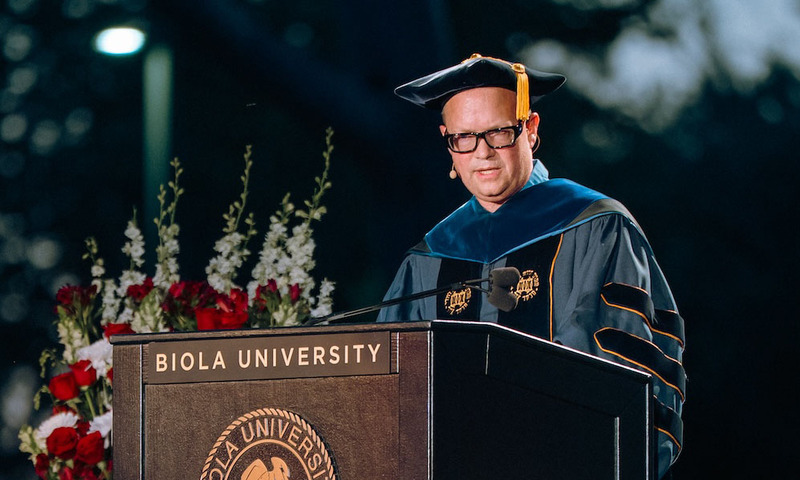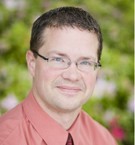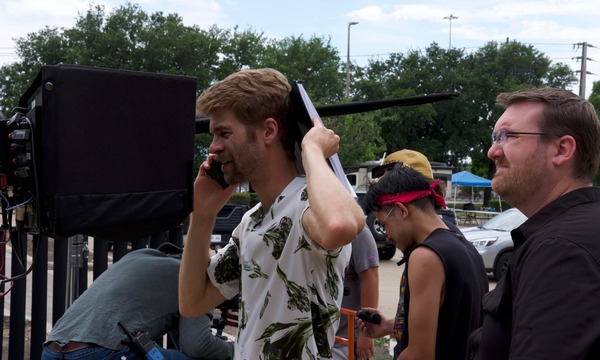On May 9 and 10, 2025, Biola hosted the 2025 Spring Commencement Ceremonies where Professor and Chair of Old Testament and Semitics Dr. Kenneth Way delivered the commencement speech. Read his advice to the 2025 graduates.
I want to personally congratulate the class of 2025! You have worked hard on some hard work. You have many good reasons to celebrate today, and it’s my privilege to celebrate with you.
As I thought and prayed about what to share with you tonight, the Lord gave me one word: endurance. So, I want to talk about endurance—specifically endurance in the Christian life. Christian endurance is not just about coping or managing in life. Nor is it just about gainful employment or “success” in your careers and relationships, even though I wish these things for you. Christian endurance is perseverance with God regardless of circumstances. Endurance is about Christ-like character that is proven through opposition and hardship.
The Bible talks a lot about endurance. In the Old Testament, we know the wisdom-story of Job who experienced inexplicable pain and loss, yet Job’s endurance teaches us to trust that a good God has purposes that are bigger than our problems (see Job and Jas 5:11). Jesus gave the same wisdom-perspective when he said that a blind man’s suffering “happened so that the works of God might be displayed in him” (John 9:3 NIV). Jesus also says that in this world, we should expect to have trouble, but to take heart, because he has overcome the world (John 16:33). The apostle Paul tells us that suffering produces endurance, and that endurance produces character, and that character produces hope (Rom 5:3-4). And James, the brother of Jesus, says that our various troubles are “an opportunity for great joy,” knowing that the testing of our faith produces endurance, and that endurance will grow us into mature people who lack nothing (Jas 1:2-4 NLT).
Here’s the thing, graduates: I know that you all have made plans for your careers after graduation. These plans are good. You have trained and prepared for them, and some of these plans will happen exactly as you expect them to happen. However, łŇ´Ç»ĺ’s agenda for you may look different than your agenda. Even though you are the one graduating, God remains your master, and you remain łŇ´Ç»ĺ’s apprentice. You have only begun the process of growing and learning as a disciple of Jesus Christ. You get to learn from the life, teachings, and from the sufferings of Jesus. You get to learn about the goodness of his yoke along with the lightness of his burden (Matt 11:28-30).
Speaking personally, I am now fifty years old, and in my experience, I have learned that God may interrupt my plans. God may interrupt my plans because his plans are better. My life was interrupted by a diagnosis of blood cancer in 2019 when I was only 44 years old. My acute leukemia seemed to come out of nowhere! It was like an alien encounter. I was abruptly pinned to a hospital bed where I spent four months in chemotherapy and finally in full-body radiation. I had to go on medical disability for the entire academic year. It was like a forced Sabbatical in which all my plans—to write certain things, to do certain things, to go certain places were interrupted, and I find myself now doing different things, like managing my health.
But praise the Lord, I am still alive, and I get to be with you all tonight! God cured my cancer—at least for the time-being—through a bone marrow transplant. My brother Brian sacrificially donated his stem cells which were grafted into my bone marrow. But this life-saving transplant also created a chronic condition known as graft-versus-host disease (GvHD). In this condition I now experience perpetual pain, weakness, and physical limitations. I now have two DNAs, and my new immune system attacks my old body, so I have erratic, chronic challenges, especially with eyesight and muscle cramps. My declining vision and debilitating muscle pain are mostly invisible to others because I may look healthy. After all, my body is intact, and I’m still smiling, but privately I’m coping with systemic malfunctions in my body.
Right now, I am learning to accept my “creaturely finitude,” that God made physical life and time (Gen 1-2), and that these are gifts of which I am a steward. They do not belong to me. My limited lifespan belongs to God. I am learning to let go of my time and my plans. I am learning to let go of tomorrow and the future. I am also learning that łŇ´Ç»ĺ’s plans are something that we do by faith, not because they are easier, but because they are good (see Matt 11:28-30)—łŇ´Ç»ĺ’s plans are far better than my plans. I’m learning to live by faith and not by sight (2 Cor 5:7). I am learning to depend on God and others, to receive their care—especially the care of my wife Lori who loves me in sickness and in health. Folks, I am learning that our disabilities can teach us about the grace of łŇ´Ç»ĺ’s power in our state of weakness (2 Cor 12:9-10).
So, my advice to you is this: hold loosely to your plans and be open to divine detours. The divine detours are what God has been preparing for you, but they may not feel like things that you prepared for. Divine detours may seem alien at first (like they come out of nowhere), but I assure you that łŇ´Ç»ĺ’s “strange work” (Isa 28:21 NIV) was planned before the foundation of the world. Our “strains and pains” in life are, in fact, “instruments repurposed by God for the positive intentions of sanctification.” So, I exhort you, graduates, to watch and to listen for łŇ´Ç»ĺ’s good interruptions in your finite lives.
You see, Christian endurance affirms łŇ´Ç»ĺ’s goodness, even when circumstances are bad. The “goodness” of łŇ´Ç»ĺ’s creation does not preclude pain, danger, or death (Gen 1-3; Rom 8:18-39). God is good and łŇ´Ç»ĺ’s creation is good because áąĂ´v—tłó±đ Hebrew word for “good”—is about order and beauty. “Good” does not mean perfect or trouble-free because God can use the world’s “bad” things for our good (see Gen 45:5-8; 50:20; Rom 8:28). The goodness of creation means God has purposeful plans and beautiful designs for his limited cosmos and for our finite lives. The goodness of creation also means God can use the bad circumstances in our lives as catalysts to facilitate our spiritual growth.
.jpg)
Some forms of suffering can get our attention—C. S. Lewis famously described human pain as “łŇ´Ç»ĺ’s megaphone”—teaching us that we are insufficient or needy, and reminding us to lament to God and to depend on God for everything. God can use our pain—like a thorn in the flesh (2 Cor 12:7-10)—to create a vacuum of weakness in us that prepares us for an infusion of his strength (cf. Col 1:24, 29). In this way we can view troubles as a means of grace, and we can receive pain as a gift—which helps us to endure in this world. Human pain, after all, is part of łŇ´Ç»ĺ’s beautiful design for our bodies. Many years ago, Dr. Paul Brand (with Philip Yancey) wrote an illuminating book called The Gift of Pain: Why We Hurt & What We Can Do about It. By studying people who suffered from the lack of pain, Brand and Yancey help us to appreciate how pain is a privilege that is essential for healthy living. My point is that pain can play a vital role in our endurance.
So, I (want to) encourage you, (graduates)…
to make “time for the pain;” that is, to honor sacred time by resting more, going to bed earlier, and observing the life-giving principles of Sabbath;
…t´Ç value what matters most in life—namely, people;
…t´Ç practice saying “N´Ç!” when you are asked to do more. This may mean delegating tasks to others so that you are free to do what only you can do.
…t´Ç embrace weakness, dependance, and your human limitations;
…t´Ç take off your superhero cape and to put on the suffering cross; and
…t´Ç not fear aging, illness, or physical death because God is with you and his goodness pursues you (Ps 23:4, 6).
Now I want you to see that endurance requires faith. It is focused on Jesus—tłó±đ Messiah who endured the cross and showed us how to endure (cf. Isa 53). As Christians, we know that enduring suffering is a privilege that grows us. Hebrews 12 says “let us run with endurance the race God has set before us. We do this by keeping our eyes on Jesus, the champion who initiates and perfects our faith. Because of the joy awaiting him, he endured the cross, disregarding its shame. Now he is seated in the place of honor beside łŇ´Ç»ĺ’s throne. Think of all the hostility he endured from sinful people; then you won’t become weary and give up” (Heb 12:1-3 NLT; cf. Isa 53; 2 Thes 3:5). So, Hebrews 12 describes the kind of faith that fuels our endurance in life.
Faith is the game-changer, folks. It’s why people who endure suffering are described as “blessed” and joyous throughout the Scriptures (see Hab 3:18; Matt 5:4, 10-12; Col 1:24; Heb 12:2; Jas 1:12; 5:11). Isn’t blessing and joy what we want? Isn’t that why we’re here tonight? Maybe we were made for blessed endurance. Maybe the troubles and trials of life are intended for our good—tłó±đ ultimate good, to form us into the image of our Creator, Jesus Christ (cf. Matt 11:28-30; Col 3:10).
So, be blessed, class of 2025! May you…
walk by faith, not by sight, in the limited lifespan that God gave you.
…lead with łŇ´Ç»ĺ’s strength and be inspired by the suffering and weakness of the man Jesus Christ.
…let go of your agendas and hold on to łŇ´Ç»ĺ’s good plans even when things go sideways, and (even when) łŇ´Ç»ĺ’s plans seem “alien” to you.
…b´ÇłŮłó commence your race and finish your race with Christian endurance.
When you are burdened, breathe. When you’re in pain, pray. When you’re ill, lament to God. When you’re dying, hope in Jesus. Fix your eyes on Jesus, and hold on to hope! Blessed are you, class of 2025! Congratulations on this commencement!
Watch the commencement ceremony below.
 Ŕ¶Ý®ĘÓƵ
Ŕ¶Ý®ĘÓƵ


.jpg)
_(1).jpg)
_(1).jpg)